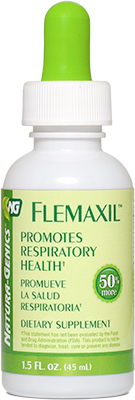1.5 FL. Oz.
Flemaxil™ has been formulated with six herbal extracts to promote the elimination of phlegm and for the support of the respiratory system. The following ingredients are part of this liquid supplement:
Lobelia grows throughout North America. The leaves are used in herbal medicine. Eclectic physicians, early North American doctors who used herbs as their primary medicine, considered lobelia to be one of the most important medicinal plants. It was used by eclectics for cough, phlegm, and spasms in the lungs from several causes. The alkaloid lobeline is responsible for most of lobelia’s activity. Preliminary trials suggest lobeline may improve respiratory function, perhaps by its abilities to reduce bronchial constrictions and to thin mucus so that it can be coughed out.
Wild cherry is native to North America. The bark of wild cherry tree is used in medicinal preparations. Wild cherry syrup has been used traditionally by herbalists for cough and other lung conditions. Wild cherry bark contains glycosides, which once broken apart in the body, act to relieve coughs by reducing spasms in the smooth muscles lining bronchioles.
Licorice has been used for several conditions. It was and remains one of the most important herbs in Traditional Chinese Medicine (TCM). Its most consistent and important uses are serving as a demulcent (soothing coating agent) in the digestive and urinary tracts, soothing sore throats, and relieving coughs. The two major constituents of licorice are glycyrrhizin and flavonoids.
Ginger has been used in Traditional Chinese Medicine for over 2,500 years. It is commonly used for digestion, respiratory disorders, motion sickness, and mobility problems. Ginger promotes anti-inflammatory activity that helps in removing toxins from the respiratory tract. It also has antioxidants to help support the immune system.
Safflower is used for several conditions, respiratory problems being one of them. Safflower may act as an expectorant by thinning phlegm and helping in its smooth discharge from the organism.
Hyssop is traditionally used to relieve chest congestion and coughs, soothe sore throats, and to act as a mild sedative. Due to the presence of volatile oil constituents in hyssop, it may provide relief for mild irritations of the upper respiratory tract.
| Supplement Facts | ||
| Serving Size: 20 Drops | ||
| Servings per Container: 45 | ||
| Amount per Serving | %DV* | |
| Proprietary blend | 1 mL | |
| Lobelia Herb (Lobelia inflata) | * | |
| Wild Cherry Bark (Prunus serotina) | * | |
| Licorice Root (Glycyrrhiza glabra) | * | |
| Ginger Root (Zengiber officinale) | * | |
| Safflower (Carthamus tinctorius) | * | |
| Hyssop Herb (Hyssopus officinalis) | * | |
| *Daily Value not established | ||
Other Ingredients: Vegetable glycerin, deionized water, and grain alcohol.
Recommendations: As a dietary supplement, take twenty (20) drops with juice or water three (3) times daily.
Caution: Do not use this product if pregnant or nursing. Do not use
this supplement if the band around the cap is broken or missing.
If symptoms persist, consult a doctor. Keep this product out of reach
of children.
Storage: Keep tightly closed in a dry place and do not expose to excessive heat.
The statements above have not been evaluated by the Food and Drug Administration (FDA).
This product is not intended to diagnose, treat, cure or prevent any disease.





